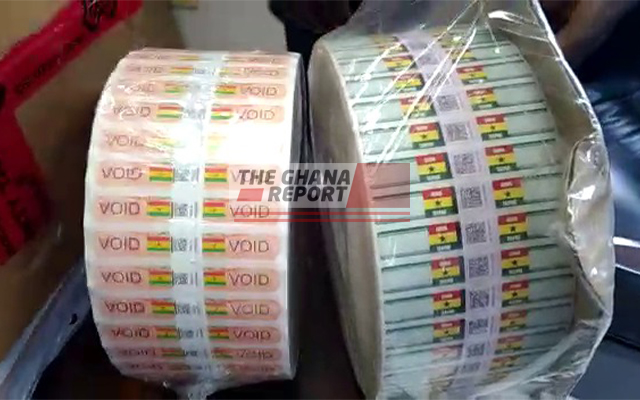Two sentenced…As GRA changes tax stamps in March
De La Rue, a UK-based manufacturer of security-printed products, will produce Ghana’s Excise Tax stamps beginning March 2021 to enhance tax revenue and deal with fake products.
The new stamps would have enhanced security features to provide extra sophistication while simplifying the efficiency of the system introduced in 2017 by the Ghana Revenue Authority (GRA).
The GRA contracted Authentix which implemented the first tax stamps, but the agreement ends in 2021, necessitating the engagement of De La Rue for the next five years.
Mr Kwabena Apau Awua Anto, the Chief Revenue Officer in charge of Excise Unit of GRA, explained to theghanareport.com the new stamp has “more security features” and will run concurrently with the old ones which would be faded out gradually.
Locally manufactured soft drinks will have orange tags, while the imported ones have purple colours.
For alcoholic beverages classified as spirits, the new stamp is coded orange, replacing the green stamps.
Ghanaian print company Buck Press would partner the company which prints England’s currency notes.

De La Rue’s solution is based on the DLR Certify™ software platform, a proven digital solution, which enables customers to uniquely identify, manage, authenticate and trace an excisable product from the manufacturer to retailer.
It would cost Ghana between 1pesewa and 5pesewas per unit stamp depending on the exchange rate.
Due to the mandatory requirement of the stamps on selected products, criminals have turned to counterfeits, a major headache for the GRA.
But the GRA explained it’s “revenues have gone up” since the introduction of the tax stamps.
After implementing the tax stickers, breweries increased the use of local raw materials to enjoy tax rebates contained in the local content law that gives companies some tax reliefs.
“Instead of 47.5% tax some of them are paying 10% tax on beer”, and that has swallowed a huge portion of the revenues for the government.
Benchmark tax reduction on imports by the President Akufo-Addo government at the ports have also shaved off some revenue from excise duty, but the “gains have been significant”.
Previously, several dealers in excisable products had evaded the GRA, but the tax stamps have compelled the dealers to be captured in the tax authority’s database.
“Our taxpayer population [for the sector] was around 115 in 2017 which has increased to 400 and every day they keep coming,” Mr Anto emphasized. “Revenue for some products have increased more than 10 times. Somebody was paying GHC40,000, but now they are paying GHC 450,000 monthly on excise”.
The GRA has subsequently advised the public to check for genuine stamps on products before purchase.
What is the Excise Tax Stamp?
The Government of Ghana introduced the Excise Tax Stamp Act 2013 (Act 873) in 2013 to provide for the affixing of Excise Stamps on specified excisable products to enhance accountability on those products.
The Excise Stamp is affixed on specified excisable goods manufactured or imported into Ghana. It applies to mineral water – bottled and other packaged water excluding sachet water; carbonated soft drinks; malt drink; stout; beer-including cider beer; wines- including sparkling wine; spirits; cigarettes and other tobacco products; and textiles.
Any person who puts or releases the excisable products for sale without the stamp affixed on the products commits an offence and is liable to a fine not exceeding three hundred per cent of the duties and taxes involved or to a term of imprisonment or to both.
A person, who performs an act with the intent of evading any duty or tax commits an offence and is liable to a fine or a term of imprisonment and any goods connected to the offence shall be forfeited.
Two persons sentenced over tax stamps
Since the introduction, one person has been sentenced to two years imprisonment while another was fined GHC 1,800 for fixing genuine stamps on fake products.
In the Greater Accra Region, three cases are being prosecuted in court and five under investigation while the Ashanti Region has three in court with two under probe.
The convict serving custodial sentence stole coils of tax stamp which contained at least 2,500 pieces.
During reconciliation by GRA with the said company on using the stamps assigned to them, it was discovered that there were some anomalies.
After examining the CCTV cameras, the company detected the theft and arrested the worker and had him prosecuted.
“Some workers in some companies steal the stamps and sell them to other manufacturers,” Mr Anto lamented.
Others have also been arrested over fake, stolen products with genuine stamps.
According to the GRA, GIHOC products are one of the most pirated and fixed with fake stamps to sell to consumers.
The GRA has constituted a team of legal brains, and prosecutors and enforcement are expected to be intensified.
Ghana Tax Stamp Authenticator
Along with the tax stamp, the GRA introduced a Ghana Tax Stamp Authenticator App on Google Play for Andriod phones.
The App can detect authentic stamps and genuine products.
Here’s how to install and use the app on your Android phone:
- Go to play store on your Android v5.0.
- Search for Ghana Tax Stamp Authenticator app
- Click on the app to install.
- Tap on the installed app and allow it to access your location, photos, videos.
- Get any excisable product with the tax stamp affixed on it.
- Open the app on your phone and scan the tax stamp.
- The app will automatically display the details of the product scanned.
- If the stamp is genuine, the scan results will show the following information:-Product Type
-Product Origin
-Human Readable Code (HR code)
-Organisation Name
-Metric Name - A fake product will not display the original producers of the product.
“We want the public to get involved so that we protect ourselves. If the scan delivers a different result other than what is publicly known. It means the product is fake,” Mr Anto stressed.
The customer can then report to the police or GRA, and action will be taken immediately.
“By this, we are protecting the company’s products and also ensure that consumers take safe products”.
Additionally, every scan undertaken with the App is registered, and GRA has immediate access for monitoring.
“If somebody scans in Kumasi, for example, within the next 30 minutes, it will alert us”, and GRA officers can be dispatched for investigations if any issues are detected.
Introduction of tax stamps for the textile industry
Tax stamps are also expected to curb challenges in the textile and garment industry.
Local producers have raised concerns about the influx of fake and smuggled textile, which is sold at lower prices to the detriment of indigenous companies.
“We have amended the tax stamp law to include textiles as one of the products to fix tax stamps,” Mr Anto indicated, with an expectation of replicating the benefits registered in the beverage industry.
Sensitisation of market dealers and importers are underway, and processes are advancement to carry out the implementation.
There are proposals to also fix tax stamps on cooking oil and electrical products.



